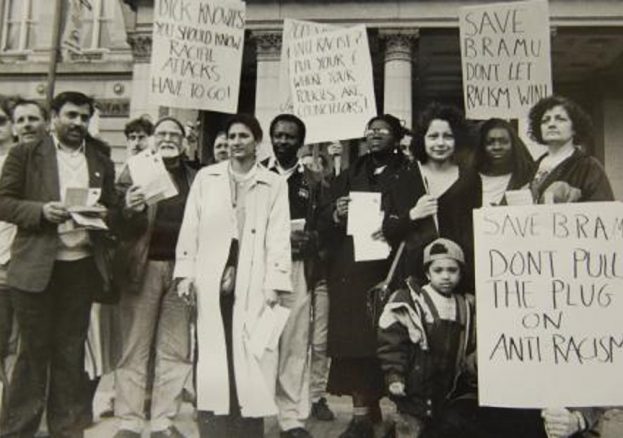
Back then, Birmingham was a city of factories and fog, with people eating their chips out of newspapers. There was rampant racism, inequality and routine police harassment. There were no protections: no Race Relations Act, no Equal Opportunities Act. In short, Britain invited Caribbean immigrants to help rebuild it in the post-war era, but made no basic preparations.
I vividly recall seeing ‘No dogs, blacks or Irish’ on the doors of so-called guest houses. Along with our Irish brethren, we had the social status of dogs. There was no right to public housing and the Race Relations Act of 1965 failed to address this.
Although we were invited to help rebuild the country, only menial tasks such as labouring and cleaning was available to black people. We often had line up on a daily basis for factory work. If we did get selected, more racism awaited us on the job. Apprenticeships were not for us; they were strictly the preserve of the local white population. This environment inevitably stifled any upward social and economic mobility, and still exists to a great extent. How many senior politicians, judges etc. in this country are black?
These days there is a lot of debate about disproportionate police use of stop and search powers against young black youths, but this is nothing new. I remember being stopped six times on one night between West Bromwich and Handsworth.
We encountered racism and injustices on a daily basis, and we dealt with it by whatever means necessary. That usually meant moving around in groups – safety in numbers – carrying knives for our own protection because the police wouldn’t protect us.
In spite of this adversity, we remained resilient. We were barred from pubs and clubs, so we created our own entertainment – Blues Parties, Cheveens and so on with old ‘Blue-Spot’ record players.
Black people were unwelcome in mainstream churches, so we created our own. From small beginnings in Pastors’ living rooms, these grew over time to become well established, and well attended black churches.
A landmark event was the visit of Malcolm X to Smethwick in 1965, but this was countered in 1968 by Enoch Powell’s infamous ‘Rivers of Blood’ speech in Birmingham.
The 1970’s was the worst period for black people in this country, many of whom were now second generation immigrants. Between 1971 and 1981, 31 murders of black or Asian people that were not investigated.
Change was slow. The Race Relations Act was amended in 1968, making it illegal to refuse housing, employment or public services on the base of race or colour. Some changes had to be forced through. After the New Cross fire, when 13 young people died at a house party, 20000 people marched on Downing Street to demand change, chanting “Nothing Said, Nothing Done”.
The uprisings of 1981 that started in Brixton and extended to Birmingham and other cities led to the Scarman Report. Despite its recommendations, little improved until the further uprising in 1985.
Michael Heseltine advised Margaret Thatcher to create a black middle class. Access courses were created in places like Bournville College, which led to jobs at the sharp end like Social Work, Youth Work and Probation. All important jobs, but the scheme was just an exercise in social control. There were no opportunities in high-level professions like Law, Medicine and Engineering.
Since the 1980’s there have been less overt, but still effective activities. Protests, marches and demonstrations were arranged in Birmingham to tackle racism, and various support groups were set up. Despite the organiser’s opposition, the Stephen Lawrence enquiry, by Sir William McPherson, held hearings in Birmingham to investigate police racism.
Today there are black actors, musicians and comedians on the world stage who hail from Birmingham, so we have come a long way, but there is still much to do.
Maxie Hayles arrived in Britain from Jamaica at the beginning of the 1960s, and has lived in Birmingham almost continuously since then.
From the start he made a stand against the racism he experienced, becoming a leading campaigner, organiser, community leader and, more recently, commentator.
He worked as a senior practitioner at St Basil’s Centre, a housing association for homeless young people. He was chairman of the Sandwell African Caribbean Forum housing project and the Birmingham Racial Attacks Monitoring Unit.
He also has strong national links. In 1997 and 2000 he went to Geneva to speak at the Committee for the Eradication of all forms of Discrimination.
He has received numerous awards for his activities, including the Active Community Award 2000, presented by Tony Blair, and The 1990 Trust Lifetime Achievement Award, presented by the Rev. Jesse Jackson.
In 1998, Maxie was instrumental in persuading the Stephen Lawrence Enquiry to come to Birmingham.
